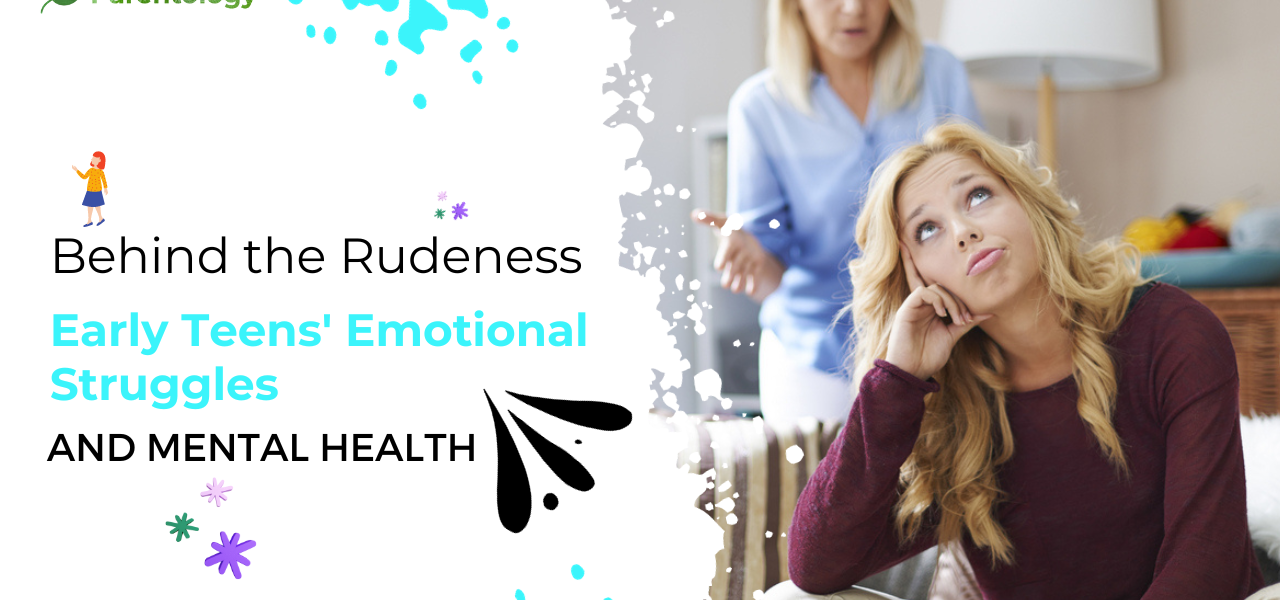Behind the Rudeness: Understanding Early Teens’ Emotional Struggles and Mental Health
Exploring Rudeness in Early Teens
Rudeness in early teens often masks underlying emotional struggles and mental health challenges. In this comprehensive guide, we’ll unravel the intricate relationship between emotional turmoil and behavior in rude teenager, offering insights and strategies for parents navigating this turbulent phase.
Understanding Rude Behavior in Early Teens
1. The Link Between Emotions and Rudeness:
- Expressing Unprocessed Emotions: Rudeness can stem from an inability to articulate or manage intense emotions appropriately.
- Defense Mechanism: Teens might resort to rudeness as a defense mechanism, guarding against perceived threats or vulnerabilities.
Early Teens’ Emotional Struggles: Triggers and Manifestations
1. Emotional Triggers for Rude Behavior:
- Social Pressures: Peer interactions, fitting in, and societal expectations can trigger emotional stress leading to rudeness.
- Family Dynamics: Conflicts or changes within the family environment can significantly impact a teen’s emotional state.
2. Manifestations of Emotional Struggles:
- Withdrawal and Isolation: Teens experiencing emotional turmoil might withdraw from social interactions or family engagements.
- Mood Swings and Irritability: Sudden mood shifts or increased irritability are common signs of underlying emotional challenges.
The Role of Mental Health in Rude Behavior
1. Mental Health Impact on Behavior:
- Anxiety and Stress: Untreated anxiety or high-stress levels can manifest as rudeness or defiance in early teens.
- Depressive Symptoms: Teens grappling with depression might display rudeness as a coping mechanism or due to emotional numbness.
Strategies for Supporting Early Teens
1. Open and Non-Judgmental Communication:
- Active Listening: Encourage open conversations, actively listening to your teen’s concerns without judgment.
- Empathy and Validation: Validate their feelings and experiences, fostering trust and understanding.
2. Establishing Coping Mechanisms:
- Emotional Regulation Techniques: Teach coping skills like mindfulness, breathing exercises, or journaling to manage emotions.
- Healthy Outlets: Encourage hobbies or activities as healthy outlets for stress and emotional release.
Addressing Rudeness: Seeking Professional Support
1. Knowing When to Seek Help:
- Persistent Behavioral Changes: If rudeness persists and significantly impacts daily life, seeking professional guidance is advisable.
- Consulting Mental Health Professionals: Therapists or counselors specializing in teen mental health can provide invaluable support.
Addressing Rudeness: Seeking Professional Support
2. Involving School Resources:
- Utilizing School Counselors: Engage with school counselors or psychologists who can offer support and guidance to rude teenager.
- Advocating for Understanding: Work with school authorities to create a supportive environment that acknowledges emotional challenges.
Cultivating Healthy Family Dynamics
1. Encouraging Emotional Expression:
- Safe Emotional Outlet: Create a safe space where your rude teenager can express emotions freely without fear of judgment.
- Modeling Healthy Communication: Lead by example, demonstrating healthy communication and conflict resolution within the family.
2. Establishing Boundaries and Consistency:
- Clear Boundaries: Set clear, reasonable boundaries, ensuring consistency in enforcing them while allowing room for negotiation.
- Predictable Structure: Provide structure and routines that offer stability, helping manage emotional reactions.
Emphasizing Self-Care and Coping Strategies
1. Prioritizing Self-Care:
- Physical Well-being: Encourage regular exercise, healthy eating habits, and adequate sleep for overall well-being.
- Stress Management: Teach stress-relief techniques such as yoga, mindfulness, or hobbies to manage daily stressors.
2. Building Coping Mechanisms:
- Problem-Solving Skills: Guide them in developing problem-solving techniques to address challenges effectively.
- Emotional Awareness: Promote self-reflection to identify and express emotions in healthy ways.
Creating Supportive Environments Beyond Home
1. Engaging Support Networks:
- Encouraging Peer Connections: Facilitate healthy friendships that offer support and understanding.
- Community Involvement: Encourage involvement in community groups or activities for a sense of belonging.
2. Utilizing Educational Resources:
- School-Based Programs: Advocate for mental health awareness programs or clubs within the school to foster understanding.
- Accessing Counseling Services: Utilize school-based counseling services for additional support and guidance.
Seeking Professional Guidance and Support
1. Recognizing the Need for Professional Help:
- Persistent Challenges: If emotional struggles persist or intensify, seeking professional guidance is crucial.
- Therapeutic Interventions: Therapists or counselors specializing in adolescent mental health can offer invaluable support.
Practical Parenting Tips for Navigating Rude Teenager and Early Teens’ Emotional Challenges
1. Foster Open Communication:
- Listen Actively: Create space for your teen to share their feelings without judgment. Listening actively can deepen understanding.
- Validate Their Emotions: Acknowledge their feelings even if you don’t agree, showing empathy validates their emotional experience.
2. Encourage Healthy Coping Mechanisms:
- Teach Problem-Solving Skills: Guide them in identifying challenges and brainstorming solutions rather than reacting impulsively.
- Promote Relaxation Techniques: Introduce relaxation methods like deep breathing or guided imagery to manage stress.
3. Model Healthy Behavior:
- Demonstrate Self-Care: Model self-care practices to emphasize the importance of maintaining mental and emotional health.
- Conflict Resolution: Display healthy conflict resolution strategies, fostering a positive environment at home.
4. Set Clear Boundaries with Empathy:
- Consistent Boundaries: Establish clear boundaries while explaining the reasons behind them, maintaining consistency.
- Empathetic Discipline: Employ disciplinary actions with empathy, focusing on understanding and growth rather than punishment.
5. Provide Emotional Support:
- Be Available: Let your teen know you’re available to talk and support them whenever they need it.
- Express Love and Affection: Show affection through words and actions, reinforcing their sense of security and support.
6. Encourage Positive Relationships:
- Promote Healthy Friendships: Guide them in forming friendships with peers who share similar values and offer positive influences.
- Family Bonding: Schedule family activities to strengthen family bonds and foster a sense of belonging.
7. Stay Informed and Supportive:
- Educate Yourself: Stay informed about adolescence and mental health, seeking professional advice when needed.
- Advocate for Your Teen: Advocate for resources or support services at school or within the community.
FAQs: Common Questions About Rude Teenager and Early Teens
Q 1: Is rudeness a normal phase in early teens?
Ans 1: While mood swings and defiance are common, persistent rudeness might indicate underlying emotional struggles needing attention.
Q 2: Can parental approaches impact a teen’s rudeness?
Ans 2: Parental communication styles and interactions significantly influence a teen’s emotional regulation and behavior.
Q 3: How can parents differentiate between typical behavior and emotional struggles?
Ans 3: Continuous and intense emotional changes impacting daily life signal the need for further evaluation and support.
Q 4: Is rudeness linked to mental health issues in early teens?
Ans 4: Rudeness can be a manifestation of underlying mental health issues like anxiety, depression, or unresolved emotional distress.
Q 5: Can peer relationships affect a teen’s behavior?
Ans 5: Peer dynamics and social pressures can contribute to emotional stress and subsequently impact a teen’s behavior and rudeness.
Q 6: How can parents initiate conversations about rude behavior without causing further conflict?
Ans 6: Use empathetic and non-judgmental communication, focusing on understanding their perspective rather than reprimanding.
Q 7: Can rude behavior in early teens be a cry for help?
Ans 7: Yes, persistent rudeness can often signal a deeper need for emotional support and understanding.
Q 8: What role does empathy play in addressing rudeness?
Ans 8: Empathy fosters understanding, nurturing a supportive environment for early teens to express their emotions without fear.
Q 9: Are there cultural or societal influences contributing to rude behavior in early teens?
Ans 9: Yes, cultural expectations and societal norms can impact how teens express and handle their emotions, affecting behavior.
Q 10: Can professional counseling help with managing rudeness in early teens?
Ans 10: Yes, therapy provides tools to manage emotions, cope with stress, and understand triggers contributing to rudeness.
Conclusion:
Understanding the intricate relationship between rude teenager and early teens’ emotional struggles and rude behavior is crucial for parents navigating this challenging phase. By recognizing the underlying emotional turmoil, fostering open communication, and seeking appropriate support, parents can empower their teens to navigate these difficulties and foster improved mental health.
For a wealth of parenting resources and insights into early teens’ emotional well-being, explore the diverse content available at Parentology, which offers guidance and support for parents in raising emotionally resilient teenagers.





